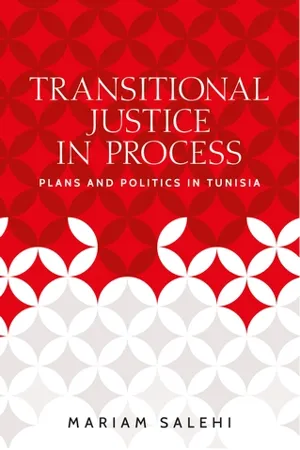
- 232 pages
- English
- ePUB (mobile friendly)
- Available on iOS & Android
About This Book
Transitional justice in process is the first book to comprehensively study the Tunisian transitional justice process. After the fall of the Ben Ali regime in 2011, Tunisia swiftly began dealing with its authoritarian past and initiated a comprehensive transitional justice process, with the Truth and Dignity Commission as its central institution. However, instead of bringing about peace and justice, transitional justice soon became an arena of contention. Through a process lens, the book explores why and how the transitional justice process evolved, and explains how it relates to the country's political transition. Based on extensive field research in Tunisia and the United States, and interviews with a broad range of Tunisian and international stakeholders and decision-makers, Transitional justice in process provides an in-depth analysis of a crucial period, beginning with the first initiatives aimed at dealing with the past and seeking justice and accountability. It discusses the development and design of the transitional justice mandate, and looks at the performance of transitional justice institutions in practice. It examines the role of international justice professionals in different stages of the process, as well as the alliances and frictions between different actor groups that cut across the often-assumed local-international divide. Transitional justice in process makes an essential contribution to literature on the domestic and international politics of transitional justice, and in particular to the understanding of the Tunisian transitional justice process.
Frequently asked questions
Information
1
The past is not another country:1 Tunisia background chapter
The legacy of colonialism, the fight for independence, and Bourguiba's rule
Colonial period
Fig...
Table of contents
- Cover
- Half-title page
- Series page
- Title page
- Copyright page
- Contents
- List of figures
- List of tables
- Acknowledgements
- List of abbreviations
- Preface
- Introduction
- 1: The past is not another country: Tunisia background chapter
- 2: Transitional justice in process: developments and dynamics
- 3: Initiating transitional justice
- 4: Designing transitional justice
- 5: Performing transitional justice
- Conclusion
- Appendix
- References
- Index